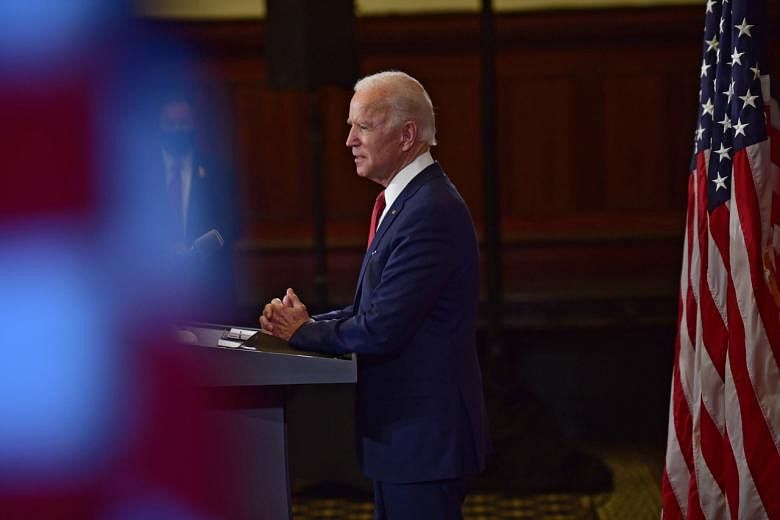SEOUL (THE KOREA HERALD/ASIA NEWS NETWORK) - The Covid-19 pandemic has accelerated many trends that have been gathering force slowly.
The pandemic transformed the tense competition between the US and China into a nascent Cold War.
To isolate China, US President Donald Trump has proposed expanding the annual G-7 summit to include South Korea, along with Australia, India, Russia, and possibly Brazil.
The goal of the strategy is to surround China with major powers that cooperate on global economic issues.
South Korea's participation in the expanded summit would symbolise its rise to the ranks of the world's most influential nations.
It already participates in the larger G-20 forum, but the expanded G-7 is a more elite club. In a phone call with President Trump earlier this week, President Moon Jae-in agreed to accept Mr Trump's invitation to join the larger group.
Mr Trump is facing an increasingly difficult race for reelection against former Vice President Joe Biden, the presumptive Democratic nominee, so this year may be his last meeting.
Conventional wisdom in South Korea has it that Mr Trump would be reelected as other presidents have in recent years.
During the pandemic, Mr Biden was holed up in his Delaware home and tried to be relevant with occasional media appearances from his basement, but he largely went ignored. 'Despite the serious economic fallout, Mr Trump appears to have a slight advantage in the race as the economy is expected to recover beginning this fall.
The nationwide protests in response to the murder of George Floyd by a Minneapolis police officer changed the dynamics of the race.
Mr Trump turned to his classic playbook of creating divisions to rally his base, but this time it backfired on him as protests raged on. Mr Biden now has the edge as Mr Trump appears incapable of dealing with the crises in front of him.
With Mr Trump's chances fading, it is time to think about what a Mr Biden presidency would mean for South Korea.
Born in 1943, Joe Biden graduated from college in 1965 just before the anti-Vietnam War movement swept university campuses. At heart, he favours an activist foreign policy based on engagement and multilateralism.
Mr Biden would thus move quickly to depart from Mr Trump's unilateral and isolationist polices by reaching out to traditional allies in Europe and Asia.
He would also restore US participation in international organisations such as the World Health Organisation and the Paris Agreement on climate change.
Dealing with Mr China will be Biden's greatest challenge. His bias toward engagement will drive him to negotiate even at the risk of appearing "soft on China." Mr Biden would like nothing more than to engage with China and appear as a peacemaker with China.
The problem for Mr Biden is the economic recovery in US and China. If the US economy recovers well, tensions with China will lessen naturally.
If the recovery is slow, however, frustrations could easily turn China into a scapegoat. If the Chinese economy recovers well, then China may be less willing to engage with the US, but if the recovery is slow, it may be more willing to engage.
The dynamic between the US and China is one of a declining and a rising great power. The US has been dominant since World War I, but particularly since World War II.
The stunning growth of China in the 21st century has put it in the position to challenge US dominance. Most great powers do not give up dominance easily, and the US is no exception. This explains the appeal of Mr Trump's strident rhetoric.
For South Korea, the changing power dynamics between the two countries poses problems. The US' decline is not an absolute decline, but relative.
Whatever happens, the US will remain an important ally of South Korea even as a rising China demands more attention.
In some quarters, holding on to an American-centric outlook will remain strong, whereas in others, the desire to embrace China will grow.
South Korea needs to walk a fine line between these two stances, both of which make loud arguments through sympathetic media.
By 2035, only 15 years from now, the power dynamics between the US and China may not matter much because India will be close to overtaking the US in overall GDP and succeed in doing so by 2040.
The declining-power-rising-power dynamics will then be between China and India. At that point, the US should be able to join South Korea in walking a fine line between the competing powers.
For South Korea, then, a Joe Biden presidency would be a transitional period from an America-first foreign policy to at multilateral one based on more equal partnership.
The writer is a columnist with the paper. The Korea Herald is a member of The Straits Times media partner Asia News Network, an alliance of 24 news media organisations.

